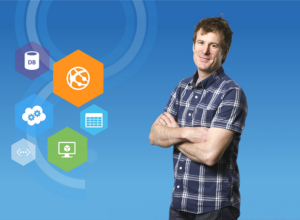Marketing is not about products, it’s about stories
If you work in marketing industry, you know that marketing requires inspiration. All the time, for anything you do - a campaign, an article, brandbuilding, etc. So, here are 10 marketing quotes that will be your today’s inspiration and will give you food for thought even for a week ahead.
- “If your stories are all about your products and services, that’s not storytelling. It’s a brochure. Give yourself permission to make the story bigger.” – Jay Baer
- “Marketing is no longer about the stuff that you make, but about the stories you tell.” – Seth Godin
- “A brand is no longer what we tell the consumer it is — it is what consumers tell each other it is.” – Scott Cook
- "If you have more money than brains, you should focus on outbound marketing. If you have more brains than money, you should focus on inbound marketing." -- Guy Kawasaki
- “Marketing without data is like driving with your eyes closed.” - Dan Zarrella
- ‘’In marketing you must choose between boredom, shouting and seduction. Which do you want?’’ Roy H. Williams
- ‘’Advertising is not being broadly seen for what it really is, namely, the single most powerful tool to produce profitable sales growth and to increase brand value. The purpose of creativity is to enhance the ability of advertising to actually sell.’’ – Brendan Ryan, CEO, FCB
- ‘’Doing business without advertising is like winking at a girl in the dark. You know what you are doing, but nobody else does.’’ – Steuart Henderson Britt, US author
- ‘’If you ever have the good fortune to create a great advertising campaign, you will soon see another agency steal it. This is irritating, but don't let it worry you; nobody has ever built a brand by imitating somebody else's advertising.’’ – David Ogilvy, advertising pioneer and founder of Ogilvy Group
- ‘’Innovation is everything. When you're on the forefront, you can see what the next innovation needs to be. When you're behind, you have to spend your energy catching up.’’ – Robert Noyce, co-founder of Fairchild Semiconductor and Intel
It’s not Networking, it’s a Social Experience
CEEDS by Webit is used to be associated with networking as any big event. At CEEDS'15 by Webit it is special because you have the opportunity to communicate with experts, C-level managers and this is a big opportunity for you since you do not meet such people daily on the street, do you?
Hold on because it offers even more and it is not just networking, but a social experience. For the record, social is all around us - like how social media has been changing not only our lives, but the whole world. During the whole ‘social experience’ at CEEDS’15, feel free to work for expanding your network with 5 various events:
- Special Fashion TV Party - Work hard, party harder and this party is gonna be glamorous. Such a party is happening for the first time in this part of the world. In 2014, Webit Global Congress in Istanbul also had a party powered by Fashion TV and it was spectacular. Fabulous models and inspired attendees created an unforgettable night together. Now, it’s Sofia’s turn to have such an event for the first time ever.
- CEOs Lunch, Leaders Lunch - broad your professional network with leaders from the digital industry while having lunch
- Chairman's Dinner, Speakers Dinner - in the end of the day having dinner with all the inspirational speakers is a chance to spend some extra time with them and ask them whatever you need to
- Rafting Summit - time to make some networking while enjoying the beauty of Bulgaria. Once in a lifetime experience.
- 2 Signature Webit parties - Webit is famous for its parties: classy, stylish and and fancy.
CEEDS’15 in 60 seconds: Beat Schwegler, Microsoft
Beat Schwegler is part of Microsoft’s technical evangelism and development team (ted), where he architects, design and codes leading edge apps and services to showcase the Microsoft platform – with a special focus on cloud. He started to focus on cloud computing in 2008 and just loves the opportunities it provides to businesses of all sizes. Before joining Microsoft, he was an independent architect and developer and was involved in a wide variety of projects, ranging from real-time building control systems, best-selling shrink-wrapped products to large scale CRM and ERP systems.
CEEDS: How will you explain cloud evangelism with one sentence?
B.S. Helping companies of all sizes to understand how to benefit from cloud computing – both form a technology and business perspective.CEEDS: What qualities needs the successful cloud evangelist?
B.S. A technology evangelist must have a strong technology background combined with the passion for public speaking and writing. It is a cycle of doing innovative projects with customer and partners, turn the outcome into reusable assets and then talk and write about it.CEEDS: What is the opportunity of cloud computing in the CEE region?
B.S. Cloud democratizes access to computing and is a key enabler for applications of global reach. I see a big opportunity in CEE to take advantage of the strong technology skills to create innovative applications and services which gain adoption not just in CEE but worldwide. The opportunity is global!CEEDS: What are your expectations from CEEDS’15? What is your motivation to be a speaker at CEEDS’15 by Webit?
B.S. I’m looking forward to learn about great solutions from participating startups and to help them to explore areas where new technology can help them to deliver even more innovation. I hope my session will help attendees to better understand the power of machine learning and predictive analytics.CEEDS: Whom you will recommend to attend CEEDS’15 by Webit?
B.S. Everyone who wants to learn about what’s hot in technology!Rule 3: Loyalty is the key
We talked about Rule No 1: Build a brand and Rule No 2: Increase your sales, so the time has come for Rule No 3. It says that loyalty is the key and it actually shouldn’t be third because it come before anything else. True customer loyalty is perhaps the greatest asset a company can develop and it’s the loyalty that builds a brand and increase the sales (Rule No1 and No2). Loyalty gives you security but at the same time it should make you cautious.
‘Unless you have 100% customer satisfaction…you must improve.’ Horst Schulz.Customer loyalty is difficult to build as well as it is to measure. Some business owners assume that all repeat customers are loyal customers, but that may not always be the case. Some other factors like pricing or convenience may contribute to repeat sales. What is more important for you is to determine why customers come back before you conclude that they are truly loyal. Remember that there are huge business benefits to creating loyal customers. How do you look at your loyal customers? As customers or as partners? It must be the second. Treat them like partners because:
‘Loyal customers, they don’t just come back, they don’t simply recommend you, they insist that their friends do business with you.’ Chip BellIt’s this what you want, isn’t it? Here are several simple steps that will help you to build customer loyalty: Act quickly to resolve problems - mistakes are not the problem, the problem is your rejection to react to these mistakes. Something went wrong with your product? Fix it, it’s simple. If you react quickly to the customer’s complain than to say ‘No, it’s your fault! My product is perfect,’ then you win from the situation. Do not be afraid to compensate customers when you have made a mistake. Respect your customers so they will respect you as well and turn to loyal customers.
‘Statistics suggest that when customers complain, business owners and managers ought to get excited about it. The complaining customer represents a huge opportunity for more business.’ Zig ZiglarBe consistent in the follow-through in every aspect of your service - no matter if it is a big or small purchase follow your customer’s behaviour. Never ignore customers with small purchases for anyone who make a big one (big ones).
‘Every contact we have with a customer influences whether or not they’ll come back. We have to be great every time or we’ll lose them.’ Kevin StirtzAsk your regular customers, “Would you recommend our product or service to others?’’ or ‘Have you recommended us to others?’ Avoid the temptation to develop a longer questionnaire in order to learn more. One question is completely enough and its answer is all you want and need to know. If more than 1/3 of respondents say ‘No’ and they would not endorse your company, you need to dig below the surface, understand the reasons, and take immediate corrective actions.
‘There is a big difference between a satisfied customer and a loyal customer.’ Shep Hyken.Reward customers who makes referrals - if you own a travel agency, give the customers who make referrals a free weekend somewhere or a half-price plane ticket, for example. As it has been said few paragraphs before, respect your customers - this way you will obtain new customers, and you’ll have a convenient way to measure the effect of word-of-mouth advertising.
‘Loyalty cannot be blueprinted. It cannot be produced on an assembly line. In fact, it cannot be manufactured at all, for its origin is the human heart-the center of self-respect and human dignity. It is a force which leaps into being only when conditions are exactly right for it-and it is a force very sensitive to betrayal,’ Maurice R. Franks.Loyal customers will be sticking with your business even if your price is not always the best, because they believe you offer the best value for the money. Think this way - loyal customers are the most effective sales team you could ever build. Webit has its loyal attendees as well, because we always offer the most relevant content. If you want to learn more about loyalty - how to build it, keep it and use it, CEEDS`15 by Webit is the place. Book your tickets now!
Rule 2: Increase your sales
After Rule No 1: Build a brand, it’s time for Rule No 2 or how to Increase your sales. After all
it’s all about it. Profit comes with sales, but sales don’t come so easy. There is no single secret, but here are 9 strategies which have proved to be successful, therefore many companies apply.
Strategy No1: Listen
The first place in any kind of a relationship is about listening and hearing. Listen doesn’t mean to do everything they tell you to do, but sometimes it’s your audience that will help you to see your mistakes. Listening to your customers does wonders for your business. So listen, listen.Strategy No2: Content Marketing
Content Marketing is a consequence of listening to your audience. Once you understand their needs and preferences you know what kind of content to deliver, so you will engage them with your company’s products and services.Strategy No3: Clever Pricing
Respect your customers and no matter how wonderful your product is keep to a clever adequate pricing. Many arguments can come up here - Apple is one of them, but have in mind that if you were Apple, you wouldn’t had been reading an article about how to increase your sales.Strategy No4: Use Upsales Effectively
Upsales are very effective to increase sales. Once they buy from you and are in a buying mood, it’s easier to close an additional and related sale. Just remember how many times you have bought a product, just because the seller had asked you “Would you like something to drink along with your pizza?” or they had given you 50% discount for the second purchase.Strategy No5: Advertising is a Necessary Evil
Face the facts and admit that even you don’t like ads. You have when they interrupt a favourite TV show, when they come up on a website, etc. Advertising, however, is a necessary evil, so in order to be recognisable from your customers, your company needs to master this art.Strategy No6: Diversify Your Product Range
The trick here is to increase your market share in other related markets. Remember that if you concentrate on one particular product then you risk your presence on the market. So always spread out a line of products - it’s your decision to what extent they will be related.Strategy No7: Be honest
If you provide a service, give a money back guarantee to your customers. If you cannot provide the service as described, never hesitate to make a refund. This way you will build trust and when your customers trust you, sales are guaranteed.Strategy No8: Keep testing
Tests and experiments will give you many answers and ideas for improvement. So, no matter how perfect you think your products is keep experimenting. Experiment with your ad copy, your price points, your website structure, promotions you are running, etc. Only after a lot of testing can you come up with the most effective way to increase sales.Strategy No9: Quality is King
Last, but not least, do not forget that you work for people and people love quality, They search for quality. If you manage to combine good quality with good price, you are going to be not a king, but an emperor on the market. At CEEDS’15 you will meet some of the most successful managers all around the world and they will inspire you with many tips and tricks to increase your sales. Buy your tickets with early bird prices now.Rule 1: Build a Brand
The market is full! Full of products, full of producers, full of ads, so normally sometimes the customers are sick of it. But you are on the market, so you need to be recognizable and to stand out among everyone else there. Rule No 1 in order to make your business to stand out is to build your brand. Brand building - yes, there is such a term and yes, there are people who are doing this.
Brand building is a mix between art and science. As every art it has its creative part and as every science - its logical, strategic one. Let’s take a look through those 5 steps/practices/tips/pieces of advice (as you prefer to call them):
- Identify what qualities, values and experiences customers associate with your business. After you identify them, you are able to build a meaningful brand for your customers. Remember, a brand is more than a just a name and logo. You have to know what does your market needs.
- Keep the conversation going - Sure, you don’t own the full control, but you can try to guide it by listening and responding to customer needs. Engage customers in person, by phone, in writing, or virtually, according to their preferences how to receive information. Social media platforms give you unprecedented quantity of information how customers find your performance, what they need improvements about, etc. Do not underestimate Facebook, Twitter, Instagram etc. As well as do not ignore customers’ perceptions. Listen, listen, listen!
- Communicate your brand to your employees - involve your customers in the whole process and explain the why and how of your brand identity. It’s not only yours anymore, but also theirs and it’s your responsibility to make the employees believe in it. The brand will need this kind of support to be effective. Remember that everything your business does is linked to your brand in the eyes of the customer. Even the way your employees dress and behave
- Create consistent brand messages - the focus of your messages must be on the qualities, values and experiences that customers associate with your business, its products and services. However, do not make them complex and complicated, follow the principle K.I.S.S. - Keep It Simple & ‘Stupid’.
- Develop a distinctive visual brand - Here comes the creative part. The visuals of your brand must reflect your identity, but if you don't have the necessary skills, find a designer to help you. Colors, design and so on - they all matter.
CEEDS’15 in 60 seconds: Nell Watson, Poikos
Nell Watson is an engineer, entrepreneur, and futurist thinker.
She is Founder & CEO of Poikos, the smartphone 3D body measurement company.
Nell's patented technology ‘dematerialises’ the 3D body scanner, by providing accurate 3D scans of the body with only 2D camera hardware, such as that found within smartphones, or laptops. This may then be applied to a range of markets, such as fashion, mass customisation, and health.
In 2013 Nell was awarded a full scholarship to join 80 other students for Singularity University’s Graduate Studies Programme. She has since become noted as a speaker and visiting lecturer on technology, and how it relates to the psychology and philosophy of life in our society.
CEEDS:How does technology relate to the psychology and philosophy of life in our society?
N.W.I've long been fascinated by how technology can change how we choose to live our lives. Machines have the capacity to view humans in ways that are perfectly objective. A machine will not typically not lie to us (it would take a wise one to do that)! This makes it harder for machines to understand human values, but it also makes it easier for them able to guide us, flawed and imperfect as we are, towards the goal of realising an idealised version of ourselves. Captology is a word coined by Stanford Experimental Psychologist BJ Fogg to describe such mechanisms (the CAPT part stands for 'Computers As Persuasion Technology'). We can create intelligent agents that act like a digital coach, helping us to choose behaviours and habits that are likely to increase our health and wellbeing. This has important implications in any area that requires willpower - such as fitness, productivity, and even good morals. I believe that the most important question of the coming age will not be 'how can we cope with being replaced by machines', but rather 'how can machines help me be a better person?'CEEDS: You have patented technology that ‘dematerialises’ the 3D body scanner by providing accurate 3D scans of the body with only 2D camera hardware. This is the app Poikos. How did you come up with the idea?
N.W.I originally wanted to help people working in sweatshop clothing factories in Asia. I reasoned that a good way to help them to empower their wealth and independence would be if there was a trend towards custom-fit goods. That way, they could use the same general skills, but create more value for that single customer, and earn a lot more for their work, as independent contractors. The problem was that there was no mass market for customised goods (sometimes called mass-customisation). Companies like Dell, for example, had pioneered the ability to customise a laptop with the exact specifications desired. However, to do this for clothing was very difficult and expensive, because of the problem of getting the right measurements. So, I set out to solve that problem. In doing so, I discovered how the same technology created by my team can be applied to a range of further areas, including shopping online, and many areas of healthcare (including physiotherapy, and prosthetic limbs).CEEDS:Could you tell us an example of it being implemented in everyday life?
N.W.Yes, in fact, Poikos itself can act as a persuasion technology. We can easily track how the body changes in size and shape over time. Furthermore, we can enable one to simulate an idealised future version of oneself - the same in every respect except bodymass - and then set that as a target to work towards. I discovered this myself by accident, and found it to be be extremely motivating! We're now working on a way to bring this capability to easily to everyone on Earth.CEEDS: What is your motivation to be a speaker at CEEDS’15 by Webit?What are your expectations from CEEDS’15?
N.W.CEEDS '15 will showcase the best of the Balkans. I have long been excited by the number and quality of startups that I've seen coming from this part of Europe, and have many entrepreneur friends in the area. Now is a chance to come and visit the cultural core where all of this ingenuity comes from, to learn from it, and to share ideas.CEEDS:Whom you will recommend to attend CEEDS’15 by Webit?
N.W.From my perspective, to get your finger on the pulse of this important wellspring of innovation, CEEDS is the place you need to be.CEEDS’15 in 60 seconds: Sotiris Makrygiannis, Eliademy
Sotiris Makrygiannis is the founder and the CEO of Eliademy. He got his first personal computer when was 11 and started his career in ICT business at 17. Sotiris launched one of the very first electronic schools in Greece in 1997 and later moved to Finland to help Nokia build mobile devices for mass market.
His last project was award winning N9, the last Nokia phone build using open source technologies. Sotiris is open minded and his personal credo is "learn fast and adapt". He believes world can be changed by democratising education with technology. Sotiris is a father of two wonderful girls, and is always passionate about his work, family and open source.
CEEDS: How will you evaluate the current condition of digital education in Eastern Europe? What needs to be improved and can you propose any action steps about that?
S.M. There 3 dimensions in the current situation:- Access to internet and the situation is improving but maybe not as fast as it should. Some of the recent EU initiatives around broadbands, mobile operators will improve the situation and hopefully within the next 2-3 years EE will be on the same level as the nordics.
- Second dimension is around teachers education and the demographics around the volume of teachers. Is known that older generations are not willing to adapt or introduce new technologies in the classroom. A massive retraining needs to occur because the issue here is more related of being afraid of the new and not because they dislike technology.
- Is the dimension of giving incentives to students on learing online , beyond Facebook, in order to build a carrer and I think that we are overemphasising in the media the power of silly apps rather redirecting the youth into educational content and service such as Eliademy.com
CEEDS: You believe world can be changed by democratizing education with technology. Do you have action steps about how this is going to happen?
S.M. In summary there 3 steps for this:- Making education accessible to all, meaning that digitalisation of education has the potential to reach and continuously train the 7 billion people on this planet. We never before had such power to connect 1 teacher to 10.000 students and get them trained en mass.
- Social contract, during the process we must keep Educational services clean. I observe a lot of interest from some publishers to get access to the user data from educational platforms. Im worried that their motive is to maintain , in the long run, their power by distributing data to affiliate networks (digital ad agencies) and impose an influence to bloggers. Educational services should remain clean and maintain their independence from marketing agencies.
- High quality adapted content in forms of services or applications. One service will not fit all, we will need diversity of applications and educational services and Im happy that this is happening as we speak.
CEEDS: You started your career in ICT business when you were barely 17 years old. How has your motivation and values changed since then?
S.M. I'm now 40 years old and I'm always eager to learn something new. I love what I do and I still have the energy of a young fellow. However now as a father I care more about what Im going leave behind to the future generations, when I was younger I was more selfish.CEEDS: What is your motivation to be a speaker at CEEDS’15 by Webit? What are your expectations from CEEDS’15?
S.M. I'm really excited to be part of CEEDS, I like the sound of it and Im also impressed with the organisation and execution of your events. I would like the world to hear a different point of view, beyond the ordinary messages, something that hopefully will stimulate their mind and place a seed of change. My expectations are around networking, visiting the beautiful Bulgaria and spreading a message.CEEDS: Whom you will recommend to attend CEEDS’15 by Webit?
S.M. I will recommend and I already have, to all C level executives and dreamers but also the young curious souls looking to hear what the global start up CEOs and executives dream about the future.CEEDS’15 in 60 seconds: Rogier Croes, MEC Global
Rogier Croes is active in the world of digital for over 15 years and has a background at creative agencies, performance agencies and media agencies. He is a visionary online marketer and passionate about his work. In the past years he has build a successful track record in progressive online and e-commerce roles working with leading market brands in all categories.
Currently Rogier is Chief Digital Officer in the CEE region, Russia, Ukraine and the CIS region. His role is to accelerate digital across the region and make full use of technological developments. He plays a key part in creating and maintaining a collaborative environment for MEC and manages the regional Interaction community, providing leadership and management.
Currently Rogier is Chief Digital Officer in the CEE region, Russia, Ukraine and the CIS region. His role is to accelerate digital across the region and make full use of technological developments. He plays a key part in creating and maintaining a collaborative environment for MEC and manages the regional Interaction community, providing leadership and management.
CEEDS: As a marketer with over 18 years experience in digital how do you see the digital market in CEE region in 5 years?
Р.C. I think in the next 5 years, there will be a big shift from focussing on media pricing to quality of work and short term campaigns to long term impact for your brand. Consumers do not get connected to brands by only throwing more advertising to them, you need to win their trust to get their attention. This means brands do need to reinvent themselves and define why they exist and why they deserve the attention from consumers. The other shift is in the personalised message. With mobile still growing fast and wearables entering the markets soon on a big scale, new opportunities for brands will arise, but who thinks these ‘new’ screens are another place for more adds, will probably not be here anymore in 5 years.CEEDS: What is your evaluation of the startup ecosystem in CEE region?
R.C. There are many very bright people in the markets and western Europe reaches out more and more to the CEE region to build great things together. I would like to see more initiatives to connect the East with the West and do great things together.CEEDS: What is your motivation to be a speaker at CEEDS’15 by Webit? What are your expectations from CEEDS’15?
R.C. I love the energy of the event and meeting old and new faces. I hope there are many technology companies and new initiatives to be inspired by. Personally I always hope to run into interesting startups, who are passionate about what they are doing and find ways to work together.CEEDS: Please share with us a part of your topic so to keep it hot.
R.C. I will speak about the impact of technology and innovation for brands and will try to inspire the people. I will talk about the impact of wearables, the effect of exponential growth, how retail will change forever, and how marketeers need to start thinking different.CEEDS: Whom you will recommend to attend CEEDS’15 by Webit?
R.C. Anybody working in this region.If you want to be a millionaire, think like a millionaire
“When we direct our thoughts properly, we can control our emotions.” – W. Clement StoneWinning the lottery will make you a millionaire, good for you if you are that lucky. Fortunately, that is not the only one option. The truth is that once you start thinking like a millionaire, the chances to become one get bigger. T. Harv Eker is an author, businessman and motivational speaker. Author of the book ‘Secrets of the Millionaire Mind’, he is known for his theories on wealth and motivation. In his book, T.Harv lists 17 statements about rich and poor people and we see that it all comes from the mind:
- Rich people believe "I create my life." Poor people believe "Life happens to me."
- Rich people play the money game to win. Poor people play the money game to not lose.
- Rich people are committed to being rich. Poor people want to be rich.
- Rich people think big. Poor people think small.
- Rich people focus on opportunities. Poor people focus on obstacles.
- Rich people admire other rich and successful people. Poor people resent rich and successful people.
“I didn’t start out life as a millionaire. I carried baggage from my past just like the rest of us including negative connotations to do with wealth and a fear of success. Later on, I learnt from successful people how they think and operate”, says T. Harv.However, successful people are usually on the TV or in news articles. Not so easy to get in touch with them, especially when you are “no one” compared to them. Still, you know what they say “If there’s a will, there’s a way” and you know nothing is impossible. In order to be a part of the millionaire environment work for your network, meet with influential people, listen to them and learn from them. CEEDS’15 by Webit will give you such an opportunity and you will be able to be a part of CEOs Lunch, Leaders Lunch as well as Chairman's Dinner, Speakers Dinner. Sitting on the same table with successful people and chatting with them is the first step of your journey of a millionaire. Don’t hesitate but buy your tickets with early bird prices now. Remember, it all starts in your mind!









